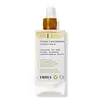What's inside
What's inside
 Key Ingredients
Key Ingredients

 Benefits
Benefits

 Concerns
Concerns

 Ingredients Side-by-side
Ingredients Side-by-side

Water
Skin ConditioningGlycerin
HumectantCaprylic/Capric Triglyceride
MaskingXanthan Gum
EmulsifyingAluminum Calcium Sodium Silicate
Tocopheryl Acetate
AntioxidantSimmondsia Chinensis Seed Oil
EmollientMelaleuca Alternifolia Leaf Oil
AntioxidantCalophyllum Inophyllum Seed Oil
AntimicrobialAloe Barbadensis Leaf Juice
Skin ConditioningChamomilla Recutita Flower Extract
MaskingTin Oxide
AbrasivePhenoxyethanol
PreservativeParfum
MaskingCinnamal
PerfumingWater, Glycerin, Caprylic/Capric Triglyceride, Xanthan Gum, Aluminum Calcium Sodium Silicate, Tocopheryl Acetate, Simmondsia Chinensis Seed Oil, Melaleuca Alternifolia Leaf Oil, Calophyllum Inophyllum Seed Oil, Aloe Barbadensis Leaf Juice, Chamomilla Recutita Flower Extract, Tin Oxide, Phenoxyethanol, Parfum, Cinnamal
Ricinus Communis Seed Oil
MaskingVitis Vinifera Oil
PerfumingCaprylic/Capric Triglyceride
MaskingCarthamus Tinctorius Seed Oil
MaskingPrunus Amygdalus Dulcis Oil
Skin ConditioningSimmondsia Chinensis Seed Oil
EmollientLavandula Angustifolia Oil
MaskingSalvia Sclarea Oil
MaskingCalophyllum Inophyllum Seed Oil
AntimicrobialBorago Officinalis Seed Oil
EmollientOenothera Biennis Oil
EmollientTocopherol
AntioxidantBisabolol
MaskingMelaleuca Alternifolia Leaf Oil
AntioxidantLimonene
PerfumingRicinus Communis Seed Oil, Vitis Vinifera Oil, Caprylic/Capric Triglyceride, Carthamus Tinctorius Seed Oil, Prunus Amygdalus Dulcis Oil, Simmondsia Chinensis Seed Oil, Lavandula Angustifolia Oil, Salvia Sclarea Oil, Calophyllum Inophyllum Seed Oil, Borago Officinalis Seed Oil, Oenothera Biennis Oil, Tocopherol, Bisabolol, Melaleuca Alternifolia Leaf Oil, Limonene
Ingredients Explained
These ingredients are found in both products.
Ingredients higher up in an ingredient list are typically present in a larger amount.
Calophyllum Inophyllum Seed Oil comes from the Tamanu tree. This tree grows in tropical regions of Asia and Polynesian countries such as Fiji.
Calophyllum Inophyllum Seed Oil contains many fatty acids such as linoleic, oleic, stearic, and palmitic acid. These properties help your skin stay hydrated.
As an antioxidant, Calophyllum Inophyllum Seed Oil may also slow down the signs of aging. Antioxidants help fight unstable free-radical molecules. These molecules may damage your skin cells and speed up aging. By helping to stabilize these molecules, antioxidants may help slow the signs of aging.
A study from 2015 found Tamanu oil to have antibacterial and anti-inflammatory properties.
Another study from 2009 found Tamanu Oil to help absorb UV rays. However, this should not replace your sunscreen.
Due to the fatty acid content, this ingredient may not be fungal-acne safe.
Learn more about Calophyllum Inophyllum Seed OilThis ingredient is an emollient, solvent, and texture enhancer. It is considered a skin-softener by helping the skin prevent moisture loss.
It helps thicken a product's formula and makes it easier to spread by dissolving clumping compounds.
Caprylic Triglyceride is made by combining glycerin with coconut oil, forming a clear liquid.
While there is an assumption Caprylic Triglyceride can clog pores due to it being derived from coconut oil, there is no research supporting this.
Learn more about Caprylic/Capric TriglycerideThis tea tree oil comes from the leaves of the Tea Tree plant. Tea tree oil has antioxidant, anti-inflammatory, and antimicrobial properties.
According to the book Journal of Profiles of Drug Substances, tea tree helps in reducing acne-causing bacteria such as Propionibacterium acnes. This is due to the Terpinen components of tea tree oil.
Tea tree may cause sensitivity and irritation for some people. This oil naturally contains fragrance such as linalool and limonene.
However, research shows irritation usually occurs when using pure tea tree oil and not in cosmetic products.
Tea tree oil was found to help relieve the symptoms of psoriasis in one study.
Tea tree oil is toxic when ingested. Another study showed it to caused damage to the nervous system of dogs and cats when applied to their skin or given orally.
Learn more about Melaleuca Alternifolia Leaf OilThis oil comes from the seeds of the desert shrub called Jojoba. It is more commonly known as jojoba oil, a non-comedogenic oil.
Jojoba oil does not contain fragrance and has many fatty-acids, making it a great soothing ingredient.
It also contains Vitamin E, a great moisturizing ingredient. Vitamin E is also an antioxidant and protects your skin against oxidative damage.
This ingredient humectant properties, meaning it helps draw moisture from the air. This helps keep your skin hydrated.
While jojoba has antibacterial properties, it is only able to kill some strains of bacteria.
Studies also show it helps in wound healing. In fact, Indigenous cultures have used jojoba as a moisturizer and to help treat burns for centuries.
Fun fact: Jojoba oil similar to natural human skin sebum, so it has a great effect on dry skin. It is also promising with helping to regulate sebum production.
Due to its fatty acid content, Jojoba oil may not be fungal acne safe. We recommend speaking with a professional if you have any concerns.
Learn more about Simmondsia Chinensis Seed Oil